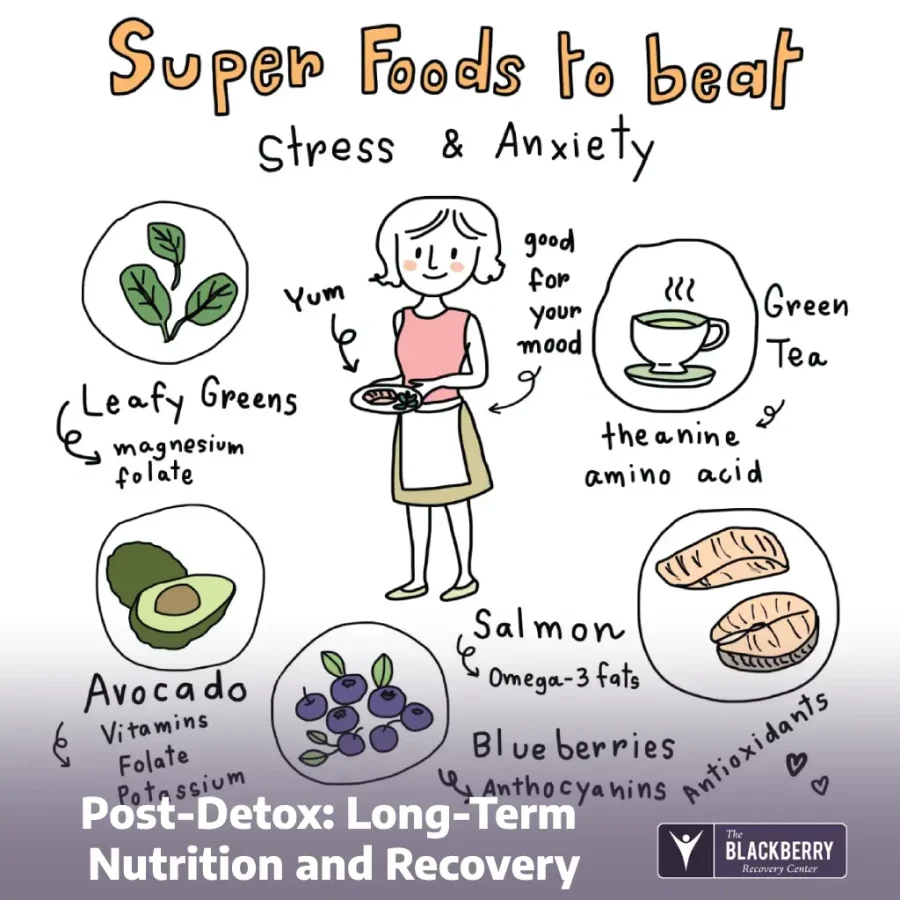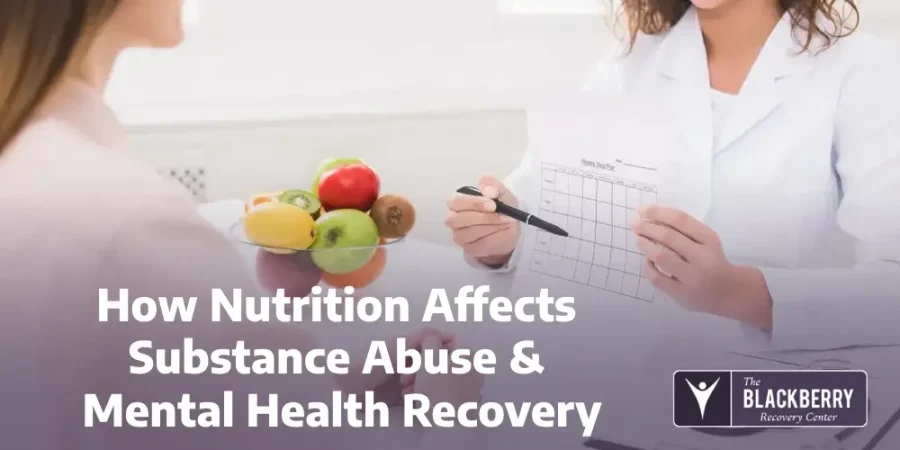Proper nutrition is important for a healthy life. And if you suffer from a substance use disorder or mental health condition, nutrition is even more vital. It is one of the essential links to a successful and long-term recovery. During periods of addiction, many people develop poor nutritional habits and, in some cases, more severe health problems like eating disorders. In order to achieve long-term recovery, you should understand the relationship between mental health, nutrition, and substance abuse.
How Nutrition Affects Mental Health
Did you know that what you eat can have a profound effect on how your brain works? Having proper nutrition affects how neurotransmitters like serotonin are produced, which literally means that nutrition partially determines how your brain processes emotions. And if you’re living with a mental health issue, poor nutrition can make everything even worse.
That becomes especially dangerous when co-occurring disorders are present. These are mental health issues that cause and reinforce addiction issues, which then go on to reinforce mental health issues. For example, someone with depression might drink to deal with their symptoms, then find their depression worsening as addiction interferes with their life. In that same way, nutrition becomes doubly important for people living with co-occurring substance use disorders. And part of the reason for that is the effect that drug and alcohol use has on the body.
The Toll of Substance Abuse on the Body
Substance abuse has a major impact on long term health and nutrition. Many people may know the harsher effects of drugs and alcohol on the body, such as liver disease from alcoholism. However, substance abuse extends well beyond this and can create a variety of impairments in physiological functions of the body, including the ability to absorb essential amino acids, vitamins and minerals.
Some of the most common effects of substance abuse include:
- Suppressed appetite: The inability to eat or forgetting to eat while under the influence or in withdrawal.
- Poor diets: People abusing drugs or alcohol will prioritize using their substance. In turn, they may neglect proper nutrition. If they do eat, their diets may be unhealthy and contain nutritional deficiencies.
- Overeating: Some substances cause excessive appetites — leading to weight gain and associated health problems.
- Gastrointestinal Disorders: Drugs and alcohol can create a wide range of GI tract problems, including irritable bowel syndrome, digestive tract inflammation, and leaky gut syndrome.
- Immune System Malfunction: Your immune system requires key amino acids, vitamins, and minerals to function properly. Without them, you’re susceptible not only to infections but also to a range of other health issues.
- Malnourishment: Over the long-term, poor diets can hinder the body’s inability to absorb essential nutrients.
- Organ damage: Alcohol and drugs can damage the pancreas, intestines, stomach lining, and other areas essential for proper digestion and absorption of vitamins and minerals.
- Hypoglycemia: Poor nutrition and substance abuse can cause low blood sugar.
The Role of Nutrition in Addiction and Mental Health Recovery

The Role of Nutrition in Addiction and Mental Health Recovery
Since drug and alcohol abuse so greatly damages organ function and metabolism, it can prevent the body from absorbing and utilizing essential nutrients. In turn, this can worsen mental health issues, since mental health is heavily affected by nutrition. And more generally, poor nutrition leads to vitamin deficiencies, weight loss/weight gain, and a host of other health issues. That’s why it’s essential to recognize the importance of nutrition and substance abuse recovery. This will supply your body with the energy it needs to not only support recovery but kickstart its repair.
Stages of Nutrition and Substance Abuse Recovery
Your nutritional needs change as you go through the process of recovery. It’s important to bear this in mind, so you have the right dietary tools to supplement the healing process.
Nutrition and Detox
The detox phase can be one of the most physically demanding stages of recovery. Physical side effects of detoxification can include vomiting, constipation, nausea, diarrhea, and fatigue. For this reason, it’s crucial to have a balanced nutritional strategy to boost energy and improve overall mood and health during the detox process.
Some of the key things you should be aware of:
- Detoxification may decrease your appetite; consider nutritional supplements such as protein shakes and smoothies if you are unable to eat.
- Substance abuse deregulates your digestive system and may cause you to forget what hunger feels like. Some people may even mistake hunger as a substance craving. Try to eat three meals per day along with snacks to re-calibrate your metabolism. Even if you can’t eat three full meals, try to get your body back on a more normal routine.
- Nausea is a common side effect of the detox process. Choose foods that are easy to eat, such as Jell-O, yogurt, chicken soup, and other lighter foods.
- To make up for vitamin deficiencies, your health counselors may prescribe or recommend vitamins. These may include Vitamin D, B vitamins, zinc, iron, and folate.
- If you experience constipation, look for high fiber foods like fruits, leafy greens, and whole grains.
- Addicts often replace one addiction for another. Be careful that food doesn’t fill your void and lead to unwanted weight gain and its associated health problems.
The symptoms of detoxification closely resemble those of the flu. During this time period, you need to take extra care of your body and ensure you get the right nutrients to fight the other side effects of withdrawal. The length of detox will vary depending on the substance you abused and how long you used it, but a healthy diet can help speed up this process and get you back on the right track.
Post-Detox: Long-Term Nutrition and Recovery
Once you finish detox and enroll in a treatment program, you should learn some long-term recovery strategies. In the months after detox, you’ll work through the stages of your program by attending counseling sessions, learning new behaviors, and identifying triggers. A healthy diet can only help you sustain this process and avoid relapse.

Post-Detox_ Long-Term Nutrition and Recovery
Some of the essential dietary and nutritional guidelines for addiction recovery include:
- Eat complex carbohydrates: Complex carbs, found in beans, grains, and vegetables, provide long-lasting steady energy, unlike the unpredictable spikes and crashes of simple carbs. Complex carbs include bread and pasta along with healthier options like lentils, apples, corn, and potatoes.
- Exercise: Exercise is important for everybody, but even more so for people in recovery. It promotes a healthy metabolism, increases energy levels, boosts mood, and helps rebuild healthy new cells.
- Consider Vitamins and Supplements: Substance abuse put serious wear on the body. Talk with your doctor about supplements including Vitamins A and C, B-complex, and zinc. Research has proven that amino acid supplements can foster neurotransmitter repair in the brain.
- Limit caffeine: There’s nothing wrong with a cup of coffee. However, caffeine may cause dehydration and appetite suppression. If you do drink caffeine, make sure to stay hydrated.
- Watch Your Sugar Levels: Sweet foods trigger your brain’s dopamine or pleasure receptors, the same areas activated by substance abuse. Be careful of replacing this sensation with unhealthy sugar highs. Likewise, avoid processed foods that lack nutritional content.
- Increase Your Protein and Fiber Intake: Protein builds up muscles damaged by malnutrition and gives you long-lasting energy. Fiber is crucial for digestion and gives you that “full” feeling.
- Eat on a Regular Schedule: Eat regular, balanced meals to ensure your blood sugar levels stay normal, preventing hypoglycemic crashes and the urge for unhealthy snacks between meals.
Remember: your diet is an essential part of your addiction and mental health treatment process. If you are struggling or have any questions, talk with your counselors, sponsors, and other people in your support network. They can not only help connect you with nutrition therapy, but also provide guidance in other subject matters.
Creating a Recovery and Mental Wellness Nutrition Plan
After detox, your nutritional counselor will evaluate your nutritional needs. They’ll help you recognize nutritional deficiencies and create plans to meet your dietary needs. The goal is to provide a healthy and well-balanced combination of vegetables, complex carbs, healthy fats, and other important nutrients. Much like other parts of your recovery process, you need to be honest with your nutritional counselor. Tell them where you are struggling so they can help you find the right strategies for improvement.
They’ll also work with you to create a matching exercise program. In fact, many recovery centers have fitness and health facilities that you can use. These facilities may include exercise equipment and trainers to help boost well-being and improve mood. Specifically designed rehabilitation programs focusing on wellness (i.e. yoga, pilates, and meditation) may also be available. This combination of diet and exercise can boost mood and self-esteem, repair organ damage, and help minimize your urges to abuse alcohol or drugs.
Addiction Treatment Essentials: Substance Abuse and Nutrition
Long-term recovery is a holistic process that includes mental, spiritual, and emotional healing. In order to support the growth and development you achieve during your counseling, proper nutrition is vital. In addition, talk openly with your addiction specialists and support network about you you may be struggling with your diet. They’ll help you with the tools you need to repair your body and get back on the road to health.
Video
How Nutrition Can Impact Addiction Recovery
Addiction comes in many shapes and sizes, but one commonality is the connection between the brain and body. It takes more than will power to liberate someone from the shackles of addiction, but with professional support and nutrition as a foundation, the journey to recovery is within reach. On this episode of Live Foreverish, Drs. Mike and Crystal sit down with Christina Veselak, a licensed psychotherapist and founder of the Academy for Addition and Mental Health Nutrition, to discuss the top nutritional considerations for emotional stability and relapse prevention.
Webinar: Nutritional Needs and Substance Use Disorder
Podcast
Nutrition’s Role in Addiction Recovery with Kelly Miller
FAQ
- Why is nutrition important in substance abuse recovery?
Nutrition helps replenish depleted nutrients, improves physical health, and supports brain function, which aids in managing withdrawal and promoting overall recovery. - How does poor nutrition affect mental health during recovery?
Poor nutrition can worsen symptoms of anxiety, depression, and stress, hindering progress in mental health recovery. - Which nutrients are critical for recovery?
Key nutrients include omega-3 fatty acids, B vitamins, and antioxidants to improve brain function and reduce inflammation. - Can nutrition prevent relapse?
A balanced diet stabilizes mood and energy levels, reducing the likelihood of triggers associated with poor health. - How can someone create a recovery-focused meal plan?
A recovery-focused meal plan includes whole foods, lean proteins, fruits, vegetables, and hydration, tailored to individual needs and health goals.






